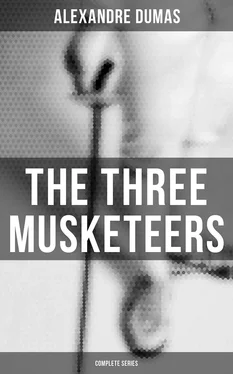Nevertheless, whether the passengers were really touched by the urbanity of Planchet or whether this time nobody was posted on the young man’s road, our two travelers arrived at Chantilly without any accident, and alighted at the tavern of Great St. Martin, the same at which they had stopped on their first journey.
The host, on seeing a young man followed by a lackey with two extra horses, advanced respectfully to the door. Now, as they had already traveled eleven leagues, d’Artagnan thought it time to stop, whether Porthos were or were not in the inn. Perhaps it would not be prudent to ask at once what had become of the Musketeer. The result of these reflections was that d’Artagnan, without asking information of any kind, alighted, commended the horses to the care of his lackey, entered a small room destined to receive those who wished to be alone, and desired the host to bring him a bottle of his best wine and as good a breakfast as possible—a desire which further corroborated the high opinion the innkeeper had formed of the traveler at first sight.
D’Artagnan was therefore served with miraculous celerity. The regiment of the Guards was recruited among the first gentlemen of the kingdom; and d’Artagnan, followed by a lackey, and traveling with four magnificent horses, despite the simplicity of his uniform, could not fail to make a sensation. The host desired himself to serve him; which d’Artagnan perceiving, ordered two glasses to be brought, and commenced the following conversation.
“My faith, my good host,” said d’Artagnan, filling the two glasses, “I asked for a bottle of your best wine, and if you have deceived me, you will be punished in what you have sinned; for seeing that I hate drinking my myself, you shall drink with me. Take your glass, then, and let us drink. But what shall we drink to, so as to avoid wounding any susceptibility? Let us drink to the prosperity of your establishment.”
“Your Lordship does me much honor,” said the host, “and I thank you sincerely for your kind wish.”
“But don’t mistake,” said d’Artagnan, “there is more selfishness in my toast than perhaps you may think—for it is only in prosperous establishments that one is well received. In hotels that do not flourish, everything is in confusion, and the traveler is a victim to the embarrassments of his host. Now, I travel a great deal, particularly on this road, and I wish to see all innkeepers making a fortune.”
“It seems to me,” said the host, “that this is not the first time I have had the honor of seeing Monsieur.”
“Bah, I have passed perhaps ten times through Chantilly, and out of the ten times I have stopped three or four times at your house at least. Why I was here only ten or twelve days ago. I was conducting some friends, Musketeers, one of whom, by the by, had a dispute with a stranger—a man who sought a quarrel with him, for I don’t know what.”
“Exactly so,” said the host; “I remember it perfectly. It is not Monsieur Porthos that your Lordship means?”
“Yes, that is my companion’s name. My God, my dear host, tell me if anything has happened to him?”
“Your Lordship must have observed that he could not continue his journey.”
“Why, to be sure, he promised to rejoin us, and we have seen nothing of him.”
“He has done us the honor to remain here.”
“What, he had done you the honor to remain here?”
“Yes, monsieur, in this house; and we are even a little uneasy—”
“On what account?”
“Of certain expenses he has contracted.”
“Well, but whatever expenses he may have incurred, I am sure he is in a condition to pay them.”
“Ah, monsieur, you infuse genuine balm into my blood. We have made considerable advances; and this very morning the surgeon declared that if Monsieur Porthos did not pay him, he should look to me, as it was I who had sent for him.”
“Porthos is wounded, then?”
“I cannot tell you, monsieur.”
“What! You cannot tell me? Surely you ought to be able to tell me better than any other person.”
“Yes; but in our situation we must not say all we know—particularly as we have been warned that our ears should answer for our tongues.”
“Well, can I see Porthos?”
“Certainly, monsieur. Take the stairs on your right; go up the first flight and knock at Number One. Only warn him that it is you.”
“Why should I do that?”
“Because, monsieur, some mischief might happen to you.”
“Of what kind, in the name of wonder?”
“Monsieur Porthos may imagine you belong to the house, and in a fit of passion might run his sword through you or blow out your brains.”
“What have you done to him, then?”
“We have asked him for money.”
“The devil! Ah, I can understand that. It is a demand that Porthos takes very ill when he is not in funds; but I know he must be so at present.”
“We thought so, too, monsieur. As our house is carried on very regularly, and we make out our bills every week, at the end of eight days we presented our account; but it appeared we had chosen an unlucky moment, for at the first word on the subject, he sent us to all the devils. It is true he had been playing the day before.”
“Playing the day before! And with whom?”
“Lord, who can say, monsieur? With some gentleman who was traveling this way, to whom he proposed a game of LANSQUENET.”
“That’s it, then, and the foolish fellow lost all he had?”
“Even to his horse, monsieur; for when the gentleman was about to set out, we perceived that his lackey was saddling Monsieur Porthos’s horse, as well as his master’s. When we observed this to him, he told us all to trouble ourselves about our own business, as this horse belonged to him. We also informed Monsieur Porthos of what was going on; but he told us we were scoundrels to doubt a gentleman’s word, and that as he had said the horse was his, it must be so.”
“That’s Porthos all over,” murmured d’Artagnan.
“Then,” continued the host, “I replied that as from the moment we seemed not likely to come to a good understanding with respect to payment, I hoped that he would have at least the kindness to grant the favor of his custom to my brother host of the Golden Eagle; but Monsieur Porthos replied that, my house being the best, he should remain where he was. This reply was too flattering to allow me to insist on his departure. I confined myself then to begging him to give up his chamber, which is the handsomest in the hotel, and to be satisfied with a pretty little room on the third floor; but to this Monsieur Porthos replied that as he every moment expected his mistress, who was one of the greatest ladies in the court, I might easily comprehend that the chamber he did me the honor to occupy in my house was itself very mean for the visit of such a personage. Nevertheless, while acknowledging the truth of what he said, I thought proper to insist; but without even giving himself the trouble to enter into any discussion with me, he took one of his pistols, laid it on his table, day and night, and said that at the first word that should be spoken to him about removing, either within the house or out of it, he would blow out the brains of the person who should be so imprudent as to meddle with a matter which only concerned himself. Since that time, monsieur, nobody entered his chamber but his servant.”
“What! Mousqueton is here, then?”
“Oh, yes, monsieur. Five days after your departure, he came back, and in a very bad condition, too. It appears that he had met with disagreeableness, likewise, on his journey. Unfortunately, he is more nimble than his master; so that for the sake of his master, he puts us all under his feet, and as he thinks we might refuse what he asked for, he takes all he wants without asking at all.”
Читать дальше












